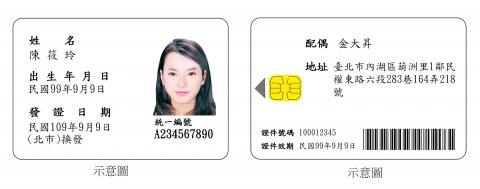New national identity cards with integrated chips proposed by the Ministry of the Interior will not incorporate biometric data, due to information security concerns, Minister of the Interior Yeh Jiunn-rong (葉俊榮) said.
The ministry had initially proposed incorporating retinal or fingerprint scan data into the cards to assist government efforts to digitize records and services, but using biometrics would only be possible with a general consensus from the public, Yeh said, adding that achieving such a consensus was unlikely.
“I personally do not support the incorporation of biometrics into identity cards ... [the system] is just not suitable for Taiwan,” he said.

Photo: Provided by the Ministry of the Interior
Department of Household Registration Affairs Director Wanda Chang (張琬宜) said that even with public support, the department would not use biometrics.
The new cards will have the ability to incorporate personal identity verification data, which would be independent of the individual’s personal records, but the function would need to be turned on by cardholders, she said.
The ministry has strict plans to protect privacy and ensure information security, she added.
The new cards would move some information onto the chip to reduce the card’s size, such as the names of the user’s parents, which are printed on current identification cards, Chang said.
However, spousal information would still be printed on the back of the new cards, she added.
The integrated chip is to support active and passive authentication, as well as basic and assisted access functionality, Chang said, adding that they would have laser etchings on the surface to prevent forgery and modification.
Assisted access functionality would require users to enter personal passwords, she said.
National Chiao Tung University computer science professor Lin Ying-ta (林盈達) said the cards should be as small and simple as possible to limit damage in the worst-case scenario of the system being hacked.
National Cheng Kung University Department of Electrical Engineering professor Lee Chung-hsien (李忠憲) said the ministry is taking the right design direction by not incorporating biometric information.
He said spousal information should also be removed from the cards.
“There are a lot of people in modern society who remain single or are divorced. This private information should be protected,” Lee said.
Taiwan Association for Human Rights chairman Weng Kuo-yan (翁國彥) said that despite the ministry omitting biometrics, the design of the new cards must still be carefully examined by the Legislative Yuan before its details are finalized.
Personal information will still be stored on the card, regardless of its simplification, and information security concerns must therefore be scrutinized, he said.

FALSE DOCUMENTS? Actor William Liao said he was ‘voluntarily cooperating’ with police after a suspect was accused of helping to produce false medical certificates Police yesterday questioned at least six entertainers amid allegations of evasion of compulsory military service, with Lee Chuan (李銓), a member of boy band Choc7 (超克7), and actor Daniel Chen (陳大天) among those summoned. The New Taipei City District Prosecutors’ Office in January launched an investigation into a group that was allegedly helping men dodge compulsory military service using falsified medical documents. Actor Darren Wang (王大陸) has been accused of being one of the group’s clients. As the investigation expanded, investigators at New Taipei City’s Yonghe Precinct said that other entertainers commissioned the group to obtain false documents. The main suspect, a man surnamed

The government is considering polices to increase rental subsidies for people living in social housing who get married and have children, Premier Cho Jung-tai (卓榮泰) said yesterday. During an interview with the Plain Law Movement (法律白話文) podcast, Cho said that housing prices cannot be brought down overnight without affecting banks and mortgages. Therefore, the government is focusing on providing more aid for young people by taking 3 to 5 percent of urban renewal projects and zone expropriations and using that land for social housing, he said. Single people living in social housing who get married and become parents could obtain 50 percent more

DEMOGRAPHICS: Robotics is the most promising answer to looming labor woes, the long-term care system and national contingency response, an official said Taiwan is to launch a five-year plan to boost the robotics industry in a bid to address labor shortages stemming from a declining and aging population, the Executive Yuan said yesterday. The government approved the initiative, dubbed the Smart Robotics Industry Promotion Plan, via executive order, senior officials told a post-Cabinet meeting news conference in Taipei. Taiwan’s population decline would strain the economy and the nation’s ability to care for vulnerable and elderly people, said Peter Hong (洪樂文), who heads the National Science and Technology Council’s (NSTC) Department of Engineering and Technologies. Projections show that the proportion of Taiwanese 65 or older would

Democracies must remain united in the face of a shifting geopolitical landscape, former president Tsai Ing-wen (蔡英文) told the Copenhagen Democracy Summit on Tuesday, while emphasizing the importance of Taiwan’s security to the world. “Taiwan’s security is essential to regional stability and to defending democratic values amid mounting authoritarianism,” Tsai said at the annual forum in the Danish capital. Noting a “new geopolitical landscape” in which global trade and security face “uncertainty and unpredictability,” Tsai said that democracies must remain united and be more committed to building up resilience together in the face of challenges. Resilience “allows us to absorb shocks, adapt under